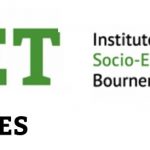This week on the Research Blog, we are exploring how our amazing community of researchers have evolved and adapted their research activities in response to the COVID-19 pandemic.
Dr Marc Vander Linden, who joined BU in March 2020 as part of the creation of the Institute for the Modelling of Socio-Environmental Transitions starts the mini-series off. Below, Marc shares his reflections, details how he has adapted and explains why we still need face-to-face interaction:
“A year ago, I joined Bournemouth University as a senior lecturer within the newly created Institute for the Modelling of Socio-Environmental Transitions (IMSET). Obviously, the prospect of a national lockdown was then looming closer and closer but I never thought that, several months later, I would still be a “virtual colleague”, delivering my – new-ish by now – duties from home and through the 13inch window of my laptop screen. We all have experienced first hand the challenges of the current situation. Being married to an academic and parent of two (very resilient, I must proudly add!) children, it goes without saying that home-schooling has taken its toll on working conditions. These have not been ideal to discover and manage the many administrative and teaching tasks incurred by a new job. In this sense, doing research has been indeed a challenge, but overall less a luxury than a necessary intellectual lifeline.
I am an archaeologist working on past population history, and long-term human-environment interactions, especially the mechanisms and consequences of the introduction and development of early farming techniques across Europe. My research covers multiple facets, each having been affected in different ways by COVID-19. The most-well-known, “romantic” thing about being an archaeologist is the field, in my case digging in caves in Montenegro. Obviously, with travel bans and the local hardships of the pandemic, any form of fieldwork has been impossible to undertake. As I was about to start surveying a new region, the lack of fieldwork not only has an immediate effect upon my research, but will also have negative repercussions felt over several years to come as I cannot dig new sites, identify new research problems and apply for corresponding funding. Yet, this unexpected pause also offered opportunities to revisit and complete older work, and prepare it for final publication thanks to a collective effort involving former post-docs, PhD students, and local Serbian and Montenegrin collaborators.
Another part of my research draws on legacy data, which is assembling, compiling and analysing datasets from published and unpublished literature. This includes, among others, collating information scattered in a multitude of individual reports related to changes in past farming regimes (e.g. presence of certain crops and weeds, or the preference for particular animal domesticates, or the contribution of hunting to the economy). The resulting “big data” not only constitute the empirical baseline for a range of analyses, but these results can also be used by collaborators from disciplines that consider estimates of anthropogenic activity (e.g. anthropogenic land cover models). Such multi-layered work is only possible by being part of an extensive international network of researchers, meeting regularly in a virtual world of Zoom meetings, shared folders, google documents, sometimes spiced up by the pleasure of doodle polls to identify the right meeting slot across multiple time zones. In many respects, the COVID-19 induced familiarity of online platforms and tools has bolstered this dimension of my research and made me more open to new collaborations.
This being said, the picture is not entirely rosy and, in so many ways, I’d say the most difficult part has actually been to become a BU colleague. After all, it is difficult to lose sight, when constantly stuck at home in front of a laptop, that you’re part of a new institution, with rules to follow and timelines to respect. As part of IMSET, “older hands” have provided outstanding support to us newbies, and lots of energy has gone into creating and maintaining contact through weekly – virtual obviously – lab meetings. Though we’ve made huge strides to come together as a group, the biggest drawback still remains to not being able to pop in someone’s office for advice or a simple chat. Online collaboration presents numerous advantages when relying upon and interacting with a huge body of collaborators and, arguably, my research has developed well despite, if not thanks, to the “new normal” imposed by COVID-19.
Yet, I’m desperately craving for the inherent simplicity and spontaneity of unplanned interactions with talented colleagues for diverse scientific horizons, those simple moments which, in my experience, are so essential in generating successful, innovative and fun research”.
 IMSET Seminar – Human adaptation and coastal evolution in northern Vietnam
IMSET Seminar – Human adaptation and coastal evolution in northern Vietnam Research in the NHS during the COVID-19 pandemic – HRA update
Research in the NHS during the COVID-19 pandemic – HRA update BU Research Matters: ADRC adapt their approach in the time of COVID-19
BU Research Matters: ADRC adapt their approach in the time of COVID-19 Why research matters at BU – now more than ever
Why research matters at BU – now more than ever










 Dr. Chloe Casey on Sky News
Dr. Chloe Casey on Sky News Final Bournemouth University publication of 2025
Final Bournemouth University publication of 2025 On Christmas Day in the Morning…
On Christmas Day in the Morning… New Nepal scoping review on maternal & neonatal health
New Nepal scoping review on maternal & neonatal health ECR Funding Open Call: Research Culture & Community Grant – Application Deadline Friday 12 December
ECR Funding Open Call: Research Culture & Community Grant – Application Deadline Friday 12 December MSCA Postdoctoral Fellowships 2025 Call
MSCA Postdoctoral Fellowships 2025 Call ERC Advanced Grant 2025 Webinar
ERC Advanced Grant 2025 Webinar Horizon Europe Work Programme 2025 Published
Horizon Europe Work Programme 2025 Published Horizon Europe 2025 Work Programme pre-Published
Horizon Europe 2025 Work Programme pre-Published Update on UKRO services
Update on UKRO services European research project exploring use of ‘virtual twins’ to better manage metabolic associated fatty liver disease
European research project exploring use of ‘virtual twins’ to better manage metabolic associated fatty liver disease